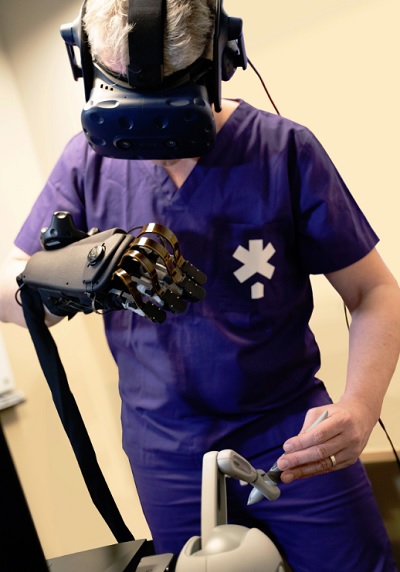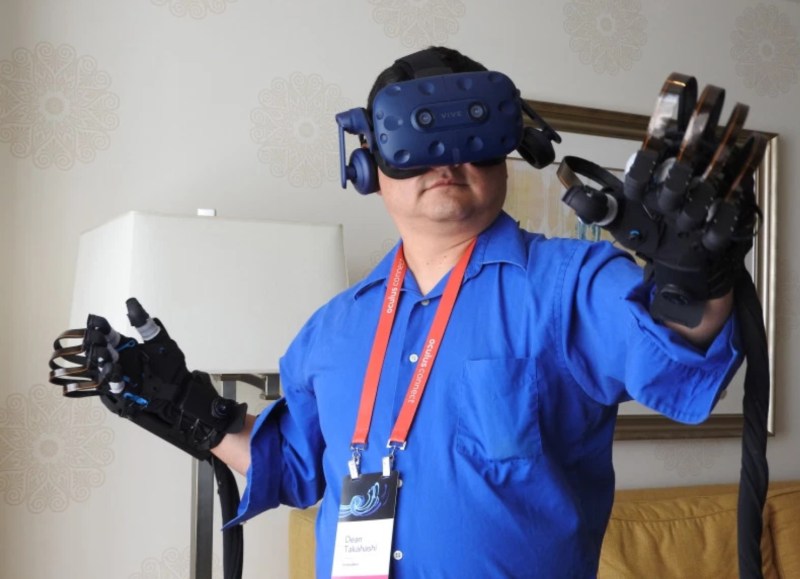FundamentalVR is teaming up with HaptX to create haptic-based surgical gloves that allow surgeons to use their hands and fingers as part of a virtual reality simulation for educational purposes.
Virtual reality has been making serious inroads into real life, and these simulations could make a difference in terms of training quality, health care costs, and the skill of surgeons.
FundamentalVR is trying to pioneer use of immersive training technology for the medical community and is showcasing the groundbreaking HaptX Gloves on its Fundamental Surgery platform. I tried the gloves out myself in a VR demo last year, and you really get a sense of contact and force feedback when you touch a virtual object.
The companies showed the demo at the annual general meeting of the American Association of Orthopedic Surgeons (AAOS).
June 5th: The AI Audit in NYC
Join us next week in NYC to engage with top executive leaders, delving into strategies for auditing AI models to ensure fairness, optimal performance, and ethical compliance across diverse organizations. Secure your attendance for this exclusive invite-only event.
Named one of the best inventions of 2018 by Time magazine, the Fundamental Surgery platform was launched back in August. It combines virtual reality (VR) with cutting-edge haptics (the sense of touch) to create a scalable flight simulator experience for trainees and qualified surgeons, allowing them to experience and navigate the visuals, sounds, and feelings they would encounter during a real surgical procedure.

Above: HaptX gloves have haptic feedback so doctors can perform simulated surgery.
What sets Fundamental Surgery apart from other solutions, the company said, is that it is designed to be equipment-agnostic — compatible with any laptop, VR headset, or haptic device, which Fundamental showcased today using HaptX Gloves combined with a 3DS Haptic arm.
At the heart of the Fundamental Surgery system is the unique Surgical Haptic Intelligence Engine (SHIETM), which is calibrated to mimic real-life sensations provided by numerous medical tools and tissue variants within a submillimeter accuracy of resistance. The joint initiative with HaptX is a further demonstration of the platform’s flexibility in integrating its haptic sensations and intelligence into third-party devices.
“When it comes to surgical training simulations, a sense of touch is a game-changer but has traditionally only been possible with immobile equipment costing hundreds of thousands of dollars,” said FundamentalVR CEO Richard Vincent in a statement. “The Fundamental Surgery platform delivers highly sophisticated tactile feedback at a fraction of the cost through a software approach that can work with a range of haptic devices. Our platform currently works with haptic arms but is designed to evolve as hardware innovations allow new products, such as HaptX Gloves, to come to market. We are proud to work with industry leaders such as HaptX and are excited to demonstrate how HaptX Gloves integrated into our Surgical Haptics Intelligence Engine takes the sensation of surgery to an exciting new and natural level.”
HaptX Gloves use microfluidic technology with 130 tactile actuators that press the user’s skin, replicating the sensation of touching a physical object. A force feedback exoskeleton applies up to 4 pounds of force per finger, enhancing perception of shape and rigidity. Motion capture technology tracks the user’s hand movements with submillimeter precision.
The company says this combination of realistic touch, powerful force, and precise motion tracking delivers the world’s most realistic haptic feedback. In the demonstration, the technology integration of HaptX and FundamentalVR allows surgeons to use their hands naturally in a virtual world. It enables a very detailed interaction with a patient during an Anterior Total Hip Arthroplasty simulation, allowing users to feel the presence of bony growth around the rim of the hip socket, in addition to identifying a key ligament that helps orient a surgeon.

Above: Dean Takahashi tries out the Haptx gloves with the HTC Vive VR headset.
The realistic tactile feedback goes beyond regular simulations and helps develop the muscle memory and skills essential for effective learning. Combined with the educational content and real-time skills and knowledge assessment, this makes the platform an invaluable training tool.
“The ability to touch and interact naturally with virtual environments is transforming the way industries train workers and bring products to market,” said HaptX CEO Jake Rubin in a statement. “The health care industry is at the forefront of this shift, and it’s set to be transformed by advancements in VR and haptics. We are delighted to be working with Fundamental Surgery as our first medical partner to demonstrate how HaptX Gloves can make surgical simulations more immersive and effective.”
Today, Fundamental Surgery is deployed in a number of medical institutions, including the Mayo Clinic and the University of California at Los Angeles in the U.S., UCLH in the U.K., and Sana in Germany, with initial training packages focused on orthopedic surgical disciplines. The procedures currently supported include Spinal Pedicle Screw, Total Hip Arthroplasty (Posterior), Total Hip Arthroplasty (Anterior), and Total Knee Arthroplasty.

